九年级Unit 3 Could you please tell me where the restrooms are?单元复习课件(65张PPT)
文档属性
| 名称 | 九年级Unit 3 Could you please tell me where the restrooms are?单元复习课件(65张PPT) | 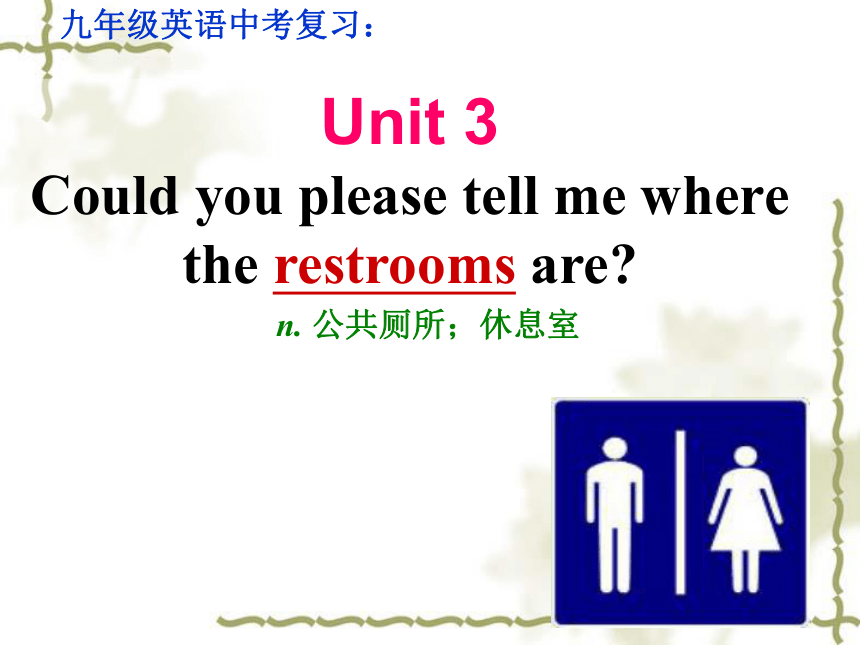 | |
| 格式 | zip | ||
| 文件大小 | 1.8MB | ||
| 资源类型 | 教案 | ||
| 版本资源 | 人教新目标(Go for it)版 | ||
| 科目 | 英语 | ||
| 更新时间 | 2019-02-14 10:52:37 | ||
图片预览

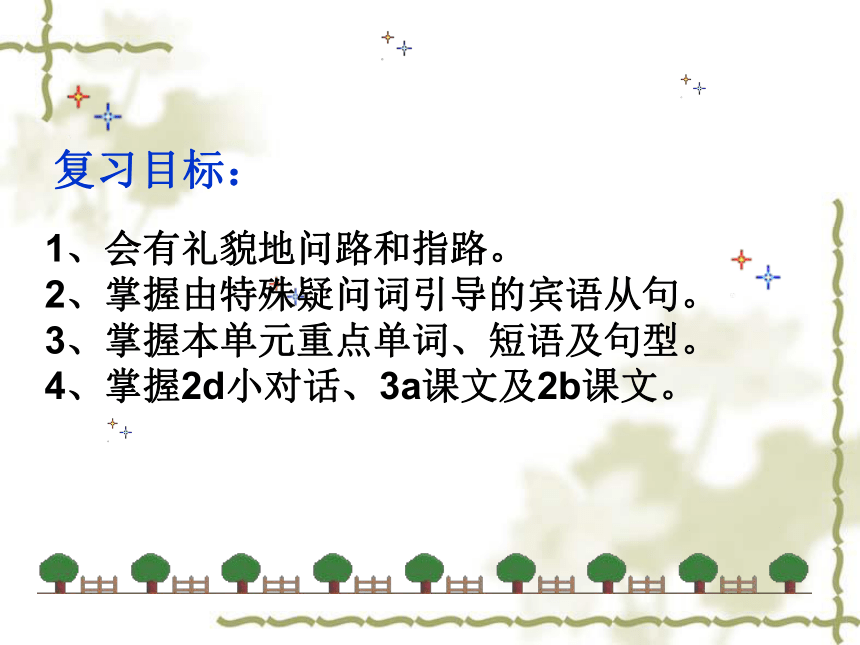
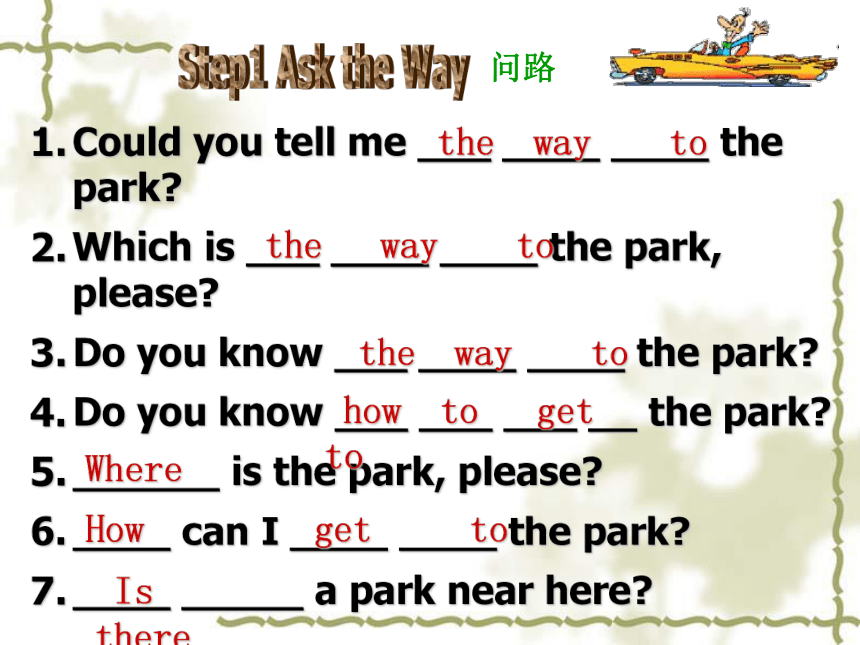
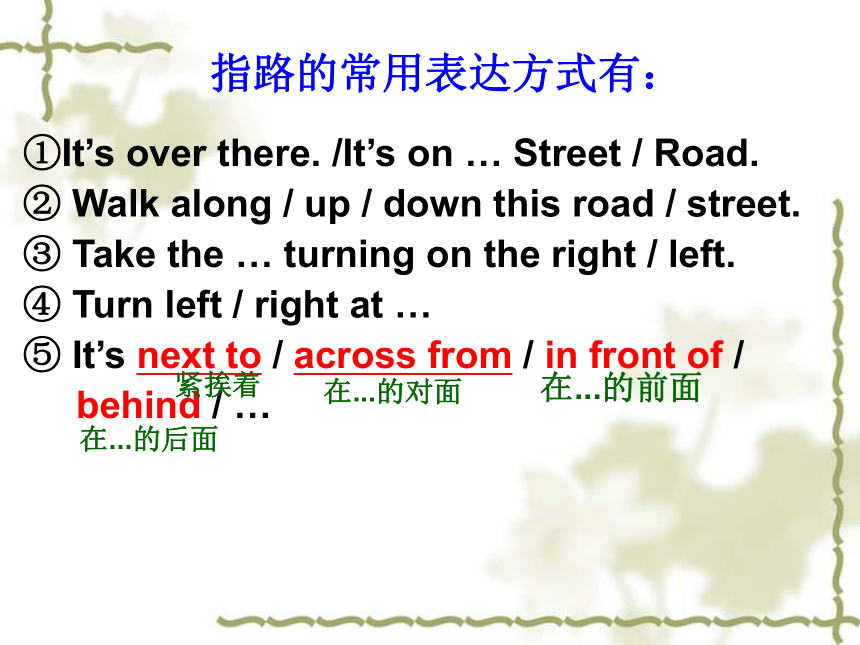
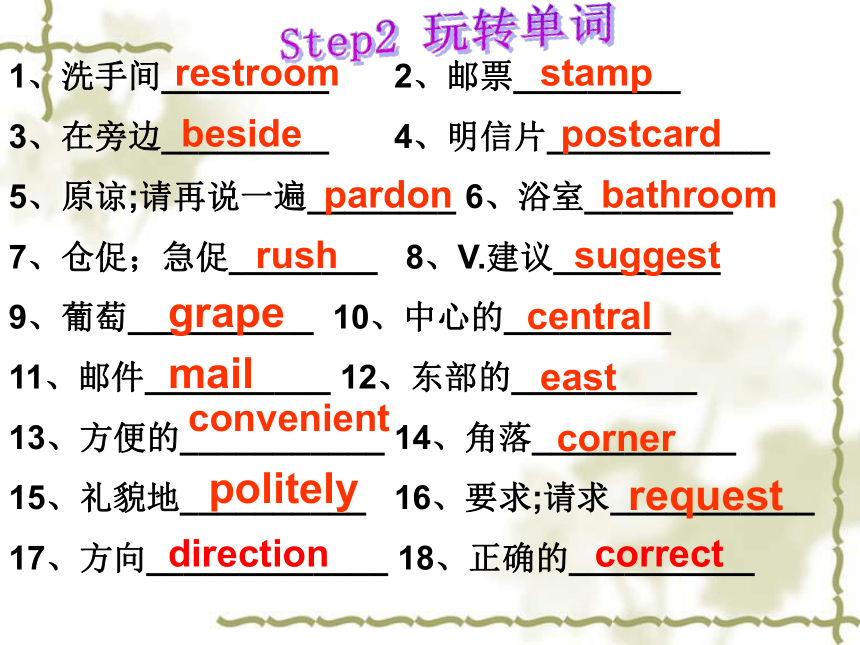
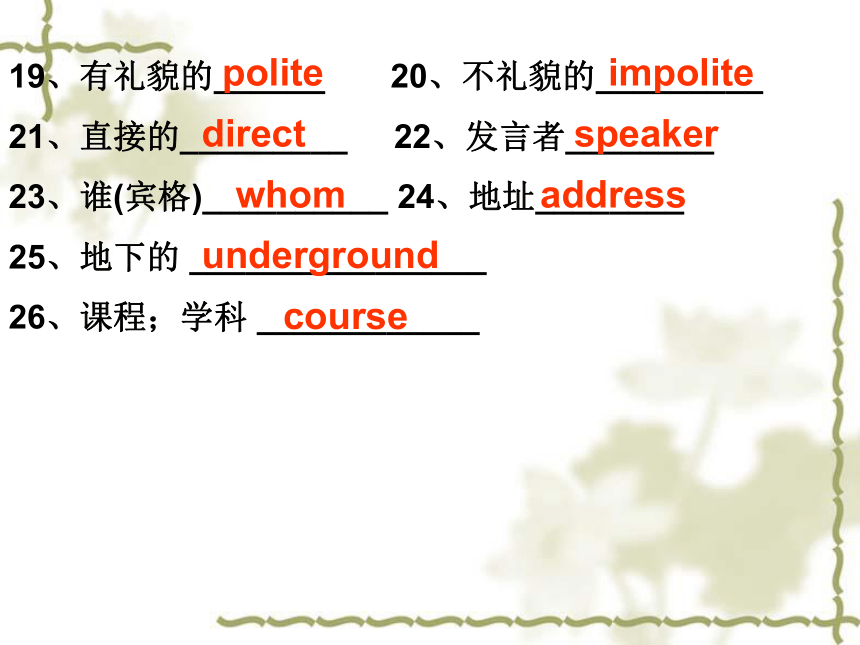
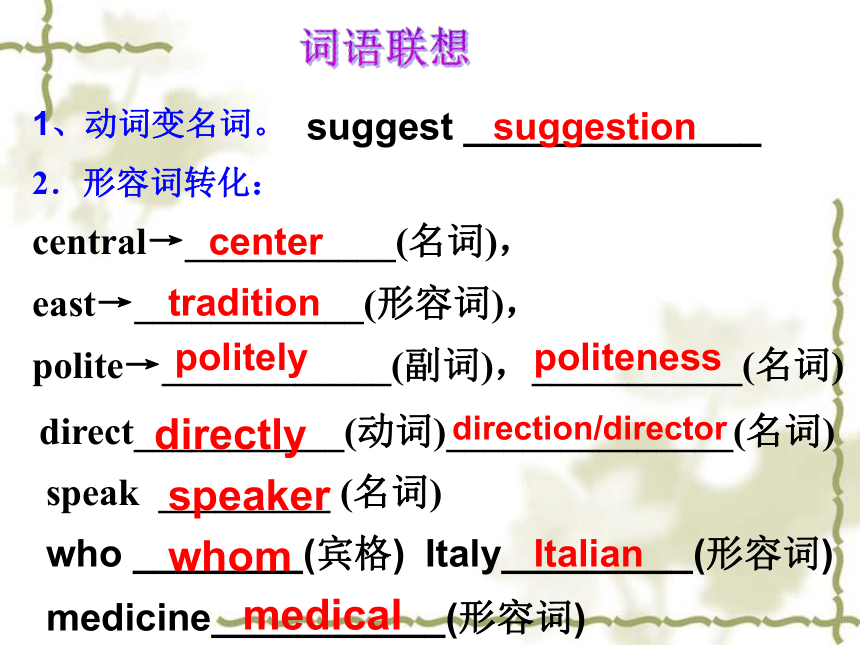
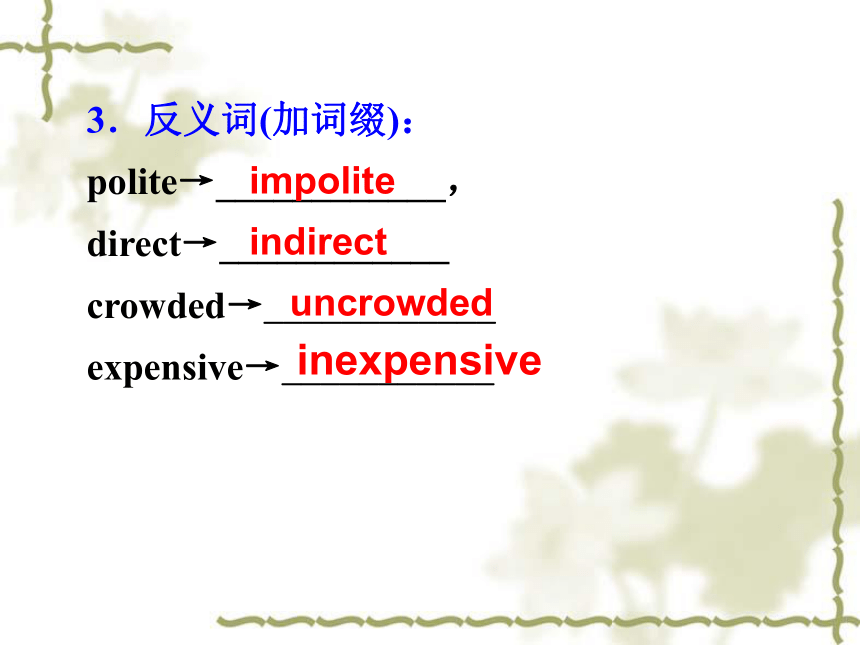
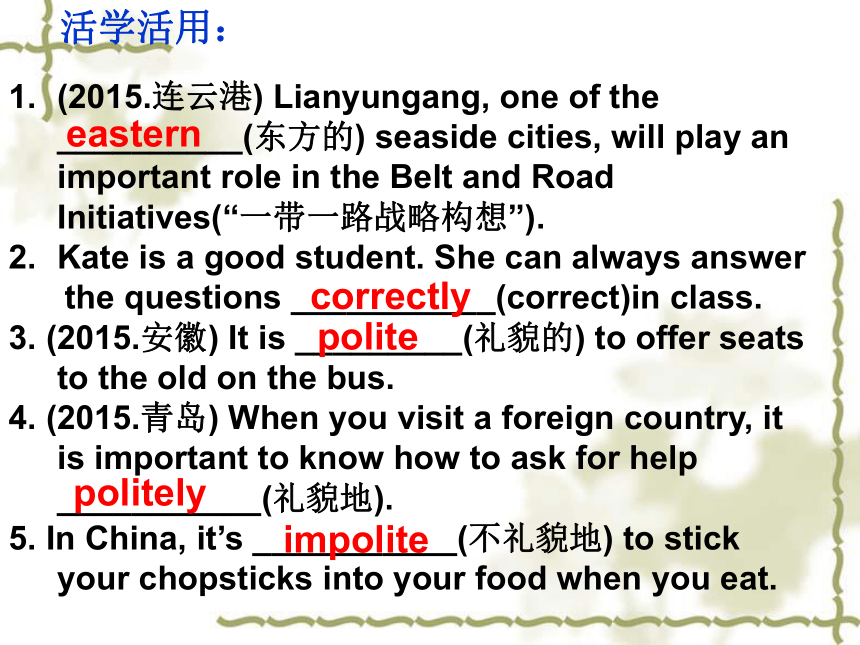
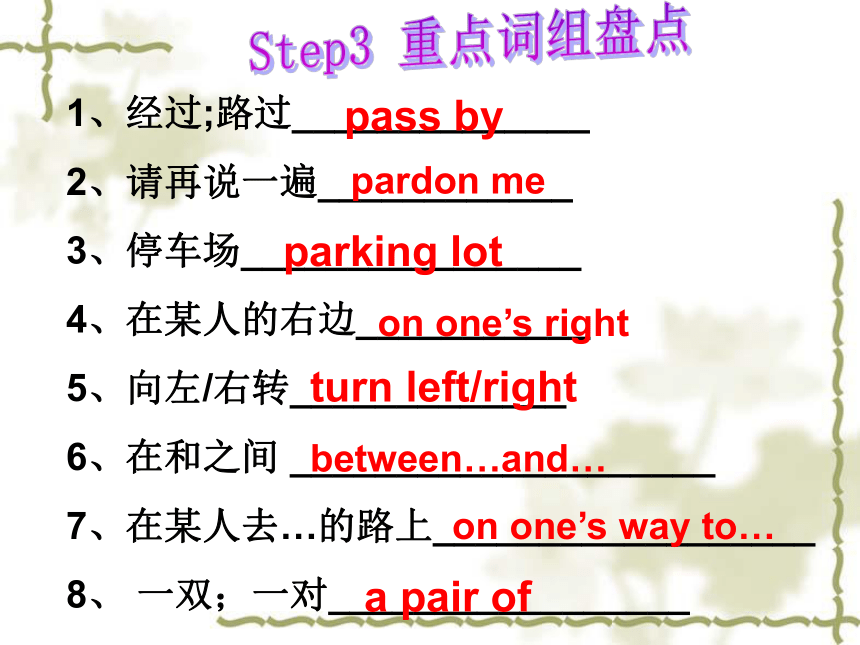
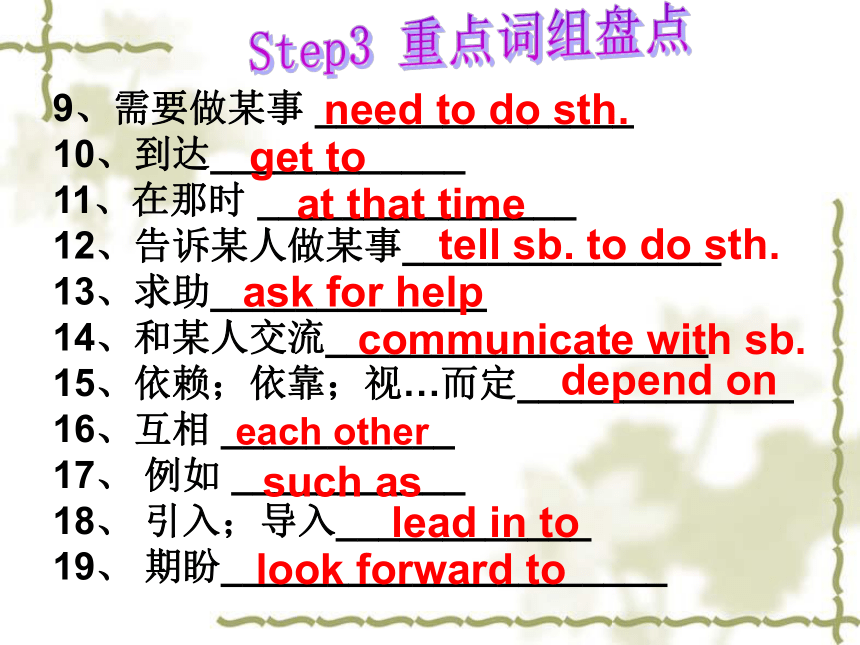
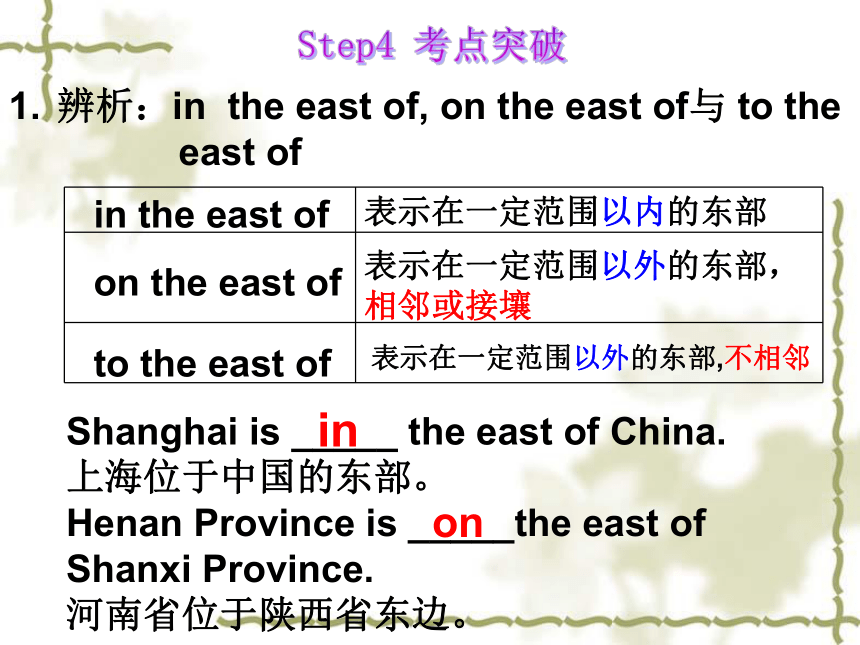
文档简介
Unit 3
Could you please tell me where the restrooms are?
n. 公共厕所;休息室
九年级英语中考复习:
复习目标:
1、会有礼貌地问路和指路。
2、掌握由特殊疑问词引导的宾语从句。
3、掌握本单元重点单词、短语及句型。
4、掌握2d小对话、3a课文及2b课文。
Could you tell me ___ ____ ____ the park?
Which is ___ ____ ____ the park, please?
Do you know ___ ____ ____ the park?
Do you know ___ ___ ___ __ the park?
______ is the park, please?
____ can I ____ ____ the park?
____ _____ a park near here?
the way to
the way to
the way to
Where
How
get to
Is there
how to get to
问路
①It’s over there. /It’s on … Street / Road.
② Walk along / up / down this road / street.
③ Take the … turning on the right / left.
④ Turn left / right at …
⑤ It’s next to / across from / in front of /
behind / …
指路的常用表达方式有:
紧挨着
在...的对面
在...的前面
在...的后面
1、洗手间_________ 2、邮票_________
3、在旁边_________ 4、明信片____________
5、原谅;请再说一遍________ 6、浴室________
7、仓促;急促________ 8、V.建议_________
9、葡萄__________ 10、中心的_________
11、邮件__________ 12、东部的__________
13、方便的___________ 14、角落___________
15、礼貌地__________ 16、要求;请求___________
17、方向_____________ 18、正确的__________
restroom
stamp
beside
postcard
pardon
bathroom
rush
suggest
grape
central
mail
east
convenient
corner
politely
request
direction
correct
19、有礼貌的______ 20、不礼貌的_________
21、直接的_________ 22、发言者________
23、谁(宾格)__________ 24、地址________
25、地下的 ________________
26、课程;学科 ____________
polite
impolite
direct
speaker
whom
address
underground
course
1、动词变名词。
suggest ______________
2.形容词转化:
central→___________(名词),
east→____________(形容词),
polite→____________(副词),___________(名词)
direct___________(动词)_______________(名词)
suggestion
center
tradition
politely
directly
speak _________ (名词)
speaker
who ________(宾格)
whom
Italy_________(形容词)
Italian
direction/director
medicine___________(形容词)
medical
politeness
3.反义词(加词缀):
polite→____________, direct→____________
crowded→____________
expensive→___________
impolite
indirect
uncrowded
inexpensive
活学活用:
(2015.连云港) Lianyungang, one of the __________(东方的) seaside cities, will play an important role in the Belt and Road Initiatives(“一带一路战略构想”).
Kate is a good student. She can always answer
the questions ___________(correct)in class.
3. (2015.安徽) It is _________(礼貌的) to offer seats to the old on the bus.
4. (2015.青岛) When you visit a foreign country, it is important to know how to ask for help ___________(礼貌地).
5. In China, it’s ___________(不礼貌地) to stick your chopsticks into your food when you eat.
eastern
correctly
polite
politely
impolite
1、经过;路过______________
2、请再说一遍____________
3、停车场________________
4、在某人的右边___________
5、向左/右转_____________
6、在和之间 ____________________
7、在某人去…的路上__________________
8、 一双;一对_________________
pass by
pardon me
parking lot
on one’s right
turn left/right
between…and…
on one’s way to…
a pair of
9、需要做某事 _______________
10、到达____________
11、在那时 _______________
12、告诉某人做某事_______________
13、求助_____________
14、和某人交流__________________
15、依赖;依靠;视…而定_____________
16、互相 ___________
17、 例如 ___________
18、 引入;导入____________
19、 期盼_____________________
need to do sth.
get to
at that time
tell sb. to do sth.
ask for help
communicate with sb.
depend on
each other
such as
lead in to
look forward to
辨析:in the east of, on the east of与 to the
east of
in the east of
on the east of
to the east of
表示在一定范围以内的东部
表示在一定范围以外的东部,相邻或接壤
表示在一定范围以外的东部,不相邻
Shanghai is _____ the east of China.
上海位于中国的东部。
Henan Province is _____the east of Shanxi Province.
河南省位于陕西省东边。
in
on
Shanghai lies _______the east of Nanjing.
上海位于南京的东面。
to
以-ern为后缀的词:
eastern 东方的 western 西方的
southern 南方的 northern 北方的
2. 特殊疑问词+动词不定式
他们正在讨论怎么避免被边缘化的问题。
They are discussing ______ ____ _______
being left out.
how to avoid
3. Could you please do sth.?请做某事好吗?
Could you please not do sth.?请不做某事好吗?
4. not…until…直到…才
(2015.重庆) Julie didn’t leave her office _________
the police arrived.
A. however B. whenever C. while D. until
直到下午三点吉姆才回来。
Jim _______ ______ ______ ______three o’clock in the afternoon.
D
didn’t come back until
5. seem的搭配:
(1) seem +adj.
(2) seem +n.
(3) seem +to do sth.
(4) It seems/seemed +that从句
She seems very happy.
Look at the dark clouds. It seems a rainy
day.
They seem to know what they’re doing.
It seems that he knows everything here.
6. “花费”句型小结:
花时间
花钱
It takes sb. some time to do sth.
Sth. takes sb. some time.
Sb. Spends some time (in)doing sth.
Sb. Spends some time on sth.
Sb. spends some money (in) doing sth.
Sb. spends some money on sth.
Sb. pays some money for sth.
Sth. costs sb. some money.
1. It ______us three days ____ _____the missing boy.
我们花了三天时间找到了那个失踪男孩。
2.That journey ________ us five days.
那次旅行花了我们五天时间。
3. My sister _____two hours ________her homework.
我姐姐花了两个小时完成了她的家庭作业。
I ________most of my free time _____ books.
4. 我的大部分空闲时间都花在了读书上。
Mike ________100 yuan _________ the books.
5. 迈克花了100元钱买那些书。
She _______ 200 yuan _______the dress.
6. 她花了200元买那条连衣裙。
The new bike _______ me six hundred yuan.
那辆新自行车花了我六百元钱。
took
to find
took
spent
finishing
spend
on
spent
buying
paid
for
cos t
1.打扰一下,你能告诉我怎样到书店吗?
Excuse me, could you please tell me _______ _______ ________
to the bookstore?
2.我想知道接下来我们应该去哪里。
I wonder ________ ________ ________ ________ next.
3.向你的同班同学提问直接的问题是可以的。
It is all right ________ ________ ________ questions to your classmates.
4.有时我们甚至要花时间导入一个请求。
Sometimes we even need to spend time ________ ________ ________ a request.
how to get
where we should go
to ask direct
leading in to
5.这会帮助你更好地与他人交流。
This will help you _____________ better ________ other people.
6、当你去外国游玩时,了解如何有礼貌地请求帮助十分重要。
_______you visit a foreign country, ______ _______important ______ ________ ________ _________ask for help politely.
7、 两种表达都是正确的,但第一种听起来不太礼貌。
Both are correct, but the first one sounds ________ _________.
communicate
with
When
it is
to know how to
less polite
由特殊疑问词引导的宾语从句
当宾语从句是特殊疑问句时,用疑问词作引导词。特殊疑问词引导宾语从句时,特殊疑问词不可省略,而且宾语从句要用陈述句语序。
— Could you please tell me where we will have
a meeting?
您能告诉我我们将在哪儿开会吗?
— I wonder what I should do next?
我想知道下一步我该做什么?
2. 含宾语从句的复合句与简单句的相互转换
由疑问词引导的宾语从句,若主句的主语或宾语与从句的主语一致,则宾语从句可以改写为“特殊疑问词+动词不定式”的形式。
I don’t know how I should do it next.
I don’t know how to do it next.
我不知道下一步应该怎样做。
3. 改写宾语从句的三个关键点:
(1)确定从句的引导词:宾语从句的引导词要根
据从句句式来确定,其对应情况如下表:
(2)确保从句语序正确:无论原句是何种句式,宾语从句要用陈述语序。
从句句式 引导词
陈述句 that
一般疑问句 if 或whether
特殊疑问句 特殊疑问词
?I don’t know where he lives.
我不知道他住在哪里。
?I believe that they will come soon.
我相信他们很快会来。
?He asked me whether I was a teacher.
他问我是否是老师。
?The teacher said that the earth goes round
the sun.
老师说地球围着太阳转。(从句为客观真
理,不受主句时态限制)
宾语从句用法
宾语从句需注意,几点事项应牢记。
一是关键引导词,不同句子词相异。
陈述句子用that;一般疑问是否(if, whether)替;
特殊问句更好办,引导还用疑问词。
二是时态常变化,主句不同从句异。主句若为现在时,从句时态应看意;主句若为过去时,从句时态向前移。
三是语序要记清,从句永保陈述序。
实战演练
(2015.陕西) –Mom, can you tell me ________ ?
I dreamed of him last night.
--Next week.
A. when my dad comes back
B. where my dad goes
C. when my dad will come back
D. where my dad will go
2. My deskmate asked me ___________.
A. when would I go to the zoo
B. whom I would play tennis with
C. how did I get home that evening
D. whether I have been to Singapore
C
B
3. –I’d like to know ___________.
--Maybe in the forest.
A. whether we will go camping
B. where we will go camping
C. whether will we go camping
D. where will we go camping
4. ---Could you tell me _________?
---Talking about festivals.
A. how they are playing
B. what they are doing
C. where they are going
D. why they are practicing
B
B
5. Do you know_______? I want to see a
funny film.
A. where the cinema is
B. where is the cinema
C. where the cinema was
D. where was the cinema
6. –It’s said that the new highway has been
completed.
--Yes, but we don’t know _______it’s to be
opened to traffic soon.
A. which B. when C. whether D. since
A
C
7. Excuse me. Could you please tell me ____?
A. how get to the Pacific Cinema
B. how I got to the Pacific Cinema
C. how I can get to the Pacific Cinema
D. how should I get to the Pacific Cinema
8. (2015.黄冈) –Excuse me, do you know____?
---Sure, there is a bookstore down the street
near here.
A. where can I get some postcards
B. where I can get some postcards
C. how can I get some postcards
D. when I can get some postcards
C
B
He Wei: This is Fun Times Park , the biggest
amusement park in our city!
Alice: I’m excited to try the rides!
2d Role-play the conversation.
He Wei: What should
we start with ?
There’s Space
World, Water
World, Animal
World ...
欢乐时光公园
游乐园
尝试这些乘玩项目
以...开始
太空世界
be excited to do sth.
对做...感到兴奋
Alice: Before we decide, could you first tell me
where the restrooms are?
He Wei: Pardon? Restroom? You want to rest?
But we haven’t even started yet!
Alice: Oh no, I don’t mean that. I mean ...
you know, a washroom or bathroom.
He Wei: Hmm ... so you mean ... the toilets?
洗手间
请再说一遍好吗?
休息室?
(用于否定句和一般疑问句)
还
意思是...
厕所
洗手间
厕所
Alice: Yes! Sorry, maybe people in China
don’t often use the word “restroom”
when they speak English.
He Wei: That's right. In China, we normally say
“toilet” or “washroom” in English.
Anyway, they’re over there.
Alice: OK. I’ll be quick!
He Wei: No problem. You don’t need to rush!
或许
通常
无论如何
仓促;急促;着急
根据对话内容与上下文,在空白处填入适当的词,使对话意思完整。毎空只填一词。
He Wei: This is Fun Times Park—the biggest
_______________park in my city!
Alice: I’m excited to try the rides!
He Wei: Where should we start? There’s Space
World, water world, Animal World….
Alice: Oh, could you tell me where the ________
are first?
He Wei: Pardon? Restroom? You want to rest?
But we haven’t even started _______!
Alice: Oh no, I don’t mean a room for_________.
I mean…you know, a washroom or
bathroom.
amusement
restrooms
yet
resting
He Wei: Hmm…so you _________...the toilet?
Alice: Yes! Sorry, maybe the word “restroom”
is not _______________used in China.
He Wei: _______. We normally say “_______”.
or “washroom” in English. Anyway,
they’re just over there.
Alice: OK. I’ll be quick! I wonder ______the
park closes today.
He Wei: Nine thirty, so you don’t need to
____________.
mean
commonly/often
Right
toilet
when
rush/ hurry
Fun Times Park — Always a Fun Time!
[Alice and He Wei are in Space World.]
Alice: I wonder where we should go next.
He Wei: How about that new ride over there?
Alice: Well ... it looks scary.
He Wei: Come on! I promise it’ll be exciting!
If you’re afraid, just shout
or hold my hand.
欢乐时光公园 ---- 总是快乐的时光
坐那边那个新的过山车怎么样?
可怕的
来吧!
承诺;保证
大叫
抓住
[After the ride…]
Alice: You were right! That was fun! I was
scared at first, but shouting did help.
He Wei: See, that wasn’t so bad, right? You
never know until you try something.
Alice: Yes, I’m so glad I tried it.
He Wei: Do you want to go to Water World now?
Alice: Sure, but I’m getting hungry. Do you
know where we can get some good food
quickly?
坐过山车后
的确
有些事情你只有尝试过你才会知道.
害怕的
He Wei: Of course! I suggest Water City Restaurant
in Water World. It serves delicious food.
Alice: Great! Let’s go!
[On their way to Water City Restaurant,
Alice and He Wei pass by Uncle Bob’s.]
Alice: Look! This restaurant looks interesting.
The sign says a rock band plays here
every evening.
建议
供应
经过
鲍勃叔叔的店
on one's way to...在去往...的路上
一支摇滚乐队
标牌
… pass by Uncle Bob’s.
Uncle Bob’s中’s属格后的名词省略掉了。’s属格后的名词如指商店、家宅等地点
时,该名词常省略。
at the doctor’s 在诊所
go to my uncle’s 去我叔叔家
He Wei: Why don’t we come back here for dinner
later. Let’s ask what time the band
starts playing.
[Alice and He Wei walk up to a staff
person at the door.]
He Wei: Excuse me, could you tell us when the
band starts playing this evening?
Staff: Eight o’clock. The restaurant is always
busy, so come a little earlier to get a table.
He Wei: OK. Thank you!
向...走去;走近
工作人员
开始表演
占个座位
我们为什么不
start doing sth.开始做某事
1. How about …?
How about …? 意思是“…怎么样? ”, 表示建议、征求意见,相当于 What about…?。
How about next week?
下星期怎么样?
How about going to a concert?
去听音乐会如何?
Language points
2. …, but shouting did help.
这是“do (does, did) + 动词原形”表示强调。
He did come but soon went back.
他的确来过, 但很快就回去了。
Do be careful with that vase!
务必小心那个花瓶!
He speak well!
他的确讲得很精彩。
3. I suggest Water City Restaurant in Water World.
suggest v. 建议;提议
I suggested going for a walk.
我建议去散步。
Could you suggest where I can park the car?
你能提出我该在哪里停车吗?
He suggested that we (should) go for a walk.
他建议去散散步。
suggest表示“建议”后接that从句中的谓语多用should加动词原形构成, should可省略。
4. It serves delicious food.
serve 在这句话的意思是“供应”
Could you serve us tea and coffee?
你能供给我们茶和咖啡吗?
This restaurant serves nice food to
customers.
这个餐馆给顾客供应美味饭菜。
serve作动词还有“服务;侍候;担任;可作 ... 用”的意思
The shop assistant is serving a customer.
店员正在接待一位顾客。
The dictionary may serve as a pillow.
这本词典可以当枕头用。
知识链接
6. Alice and He Wei walk up to a staff person at the door.
staff n. 管理人员;职工;员工
I find the hotel?staff?particularly friendly.
我发现饭店员工特别友好。
This company has a?staff?of fifty. ??
这家公司有50名职员。
Mr. Wang is a?staff?of France airline.??
王先生是法国航空公司的一名职员。
Could You Please ...?
When you visit a foreign country, it is important to know how to ask for help politely. For example, you may ask“ Where are the restrooms?” or “Could you please tell me where the restrooms are?” These are similar requests for directions. Both are correct, but the first one sounds less polite. That is because it is a very direct question. It is not enough to just ask a question correctly. We also need to learn how to be polite when we ask for help.
2b Read the article carefully.
有礼貌地
请求
正确的
你能...吗?
较不/更不礼貌
直接的
正确地
Good speakers change the way they speak in different situations. The expressions they use might depend on whom they are speaking to or how well they know each other. It is all right to ask direct questions to your classmates because
you know them well. However, If you say to your teacher, “When is the school trip?”, this might sound impolite. But if you say, “Excuse me, Mr. West. Do you know when the school trip is?”, this will sound much more polite.
会说话的人会根据不同情景改变他们说话的方式。
他们使用的表达
可能取决于他们说话的对象或
他们彼此之间的熟悉程度。
可以
非常熟悉他们
粗鲁的;无礼的
更有礼貌
Usually polite questions are longer. They include expressions such as “Could you please ...?” or “May I ask ...?” It sounds more polite to say, “Peter, could you please tell me your e-mail address?” than “Peter, tell me your e-mail address.” Sometimes we even need to spend time leading in to a request. For example, we might first say to a stranger, “Excuse me, I wonder if you can help me” or “I’m sorry to trouble you, but ...” before asking for help.
包括
例如
引入;导入
请求
lead in to意为“引入;导人”
lead to 意为“导致;通向”。
It might seem more difficult to speak politely than directly. However, it is important to learn how to use the right language in different situations. This will help you communicate better with other people.
似乎有礼貌地说要比直接表达更难。
学习在不同情况下如何使用合适的语言很重要。
更好地与...交流
1. inexpensive 不昂贵的,便宜的
inexpensive形容词,意为“不昂贵的”,其同义 词为 cheap,反义词为 expensive/dear。
inexpensive是由expensive加上否定前缀in-构
成的。
? The sweater is inexpensive.这件毛衣不贵。
Language Points
① dis-表示“不;非;相反”,如:
like喜欢 — dislike 不喜欢;
agree 同意—disagree 不同意。
② in-(im-,ir-)表示“不;非”,如:
expensive 昂贵的— inexpensive便宜的;
polite礼貌的— impolite不礼貌的;
regular有规律的— irregular无规律的。
③un-表示“不,非”,如:
able有能力的 — unable无能力的;
like像—unlike不像;
crowded拥挤的 — uncrowded不拥挤的;
陈述句中如果有带否定前缀或后缀的单词, 整个句子仍被视为肯定句,反意疑问部分用否定形式。
?She is unhappy, isn’t she?
她不高兴,是吗?
2. convenient 便利的;方便的
convenient形容词,意为“便利的;方便的”,
其主语不能是表示人的词,常用于句型
It’s convenient for sb. to do sth.,意为“对于
某人来说做某事是方便的”。
It’s convenient for us to start working right now.
我们立刻开始工作是方便的。
3. …and the clerk tells her to go to the corner
of Market and Middle.
……工作人员告诉她去市场大街和中心大街
交汇的拐角处。
corner是可数名词,意为“拐角;角落”。
常构成短语:
①in the corner of...意为“在......的拐角处/角落里”
?I found a boy crying in the comer of the room.
我发现一个男孩在房间的角落里哭。
②on/at the corner意为“在拐角处”。
?The shop is on the corner.
那家商店在拐角处。
4. When you visit a foreign country, it is important
to know how to ask for help politely.
当你去国外旅游时,知道如何礼貌 地寻求帮助
很重要。
politely作副词,意为“礼貌地;客气地”,其反 义词为impolitely(无礼地;粗鲁地);polite是其形容词形式,反义柯为impolite(无礼的)。
?He is a polite child. He speaks to everyone politely.
他是个有礼貌的孩子。他对每个 人说话都很有礼貌。
polite + -ly politely
(adj. 有礼貌的) (adv. 有礼貌地)
impolite + -ly impolitely
(adj. 无礼的) (adv. 无礼地)
6. Both are correct English, but the first one
sounds less polite.
两者都是正确的,但第一句听起来不如第二
句显得礼貌。
correct此处用作形容词,意为“正确的;恰 当的”,相当于right,其副同形式为correctly.
? I can tell you the correct answer.
我可以告诉你正确答案。
correct用作动词,意为“改正”。
? You must correct the mistakes in your homework.
你必须改正作业中的错误。
7. Usually polite questions are longer and
include more language such as “Could you
please ...?” or “Can I ask ...?”
有礼貌的问句通常更长一些,而且包括像
“Could you please ...?” 或“Can I ask ...?”之类 的表达方式。
include作及物动词,意为“包括;包含”。
?The price includes both the house and the
furniture inside.
这个价格包括房子和里面的家具。
① including用作介词,意为“包括;包含在
内”,后接名词、代词或动词-ing形式。
?Six people, including a baby, were injured in
the accident.
事故中有6人受伤,其中包括一名婴儿。
② included形容词,意为“包括在内的”,通 常置于名词之后。
?There are 100 people in this school, 20 teachers
included.
这所学校有100个人,包括20名老师。
9. I look forward to your reply.
我期待您的回复。
(1)look forward to表示“盼望;期待”,相当于
expect,特指以特别愉快的心情期待着。 其
中to为介词,后面接V-ing形式。
译:我期待着再次见到你。
误:I’m looking forward to see you again.
正:I’m looking forward to seeing you again
(2)reply用作名词,意为“答复”,相当于answer,
表示“......的答复”时,reply与answer都需要与
to连用。
? I received no reply/answer to my request.
我的要求没有收到任何答复。
10. You’re always in a rush to get to school on
time.
你为了能准时到达学校总是急匆匆 的。
on time意为“准时;按时”,相当于:
at the right time。
? Please don't be late. Come here on time.
请别迟到,准时来这里。
① in time意为“及时”。
?The man was just in time for the plane.
那个人正好赶上了航班。
② at times 意为“有时”相当于sometimes.
? I go to school without breakfast at times.
有时我不吃早饭就去上学。
③ by the time 意为“到……时候;到……之前”
? By the time we got to the cinema, the film had begun.
我们到达电影院时,电影已经开始了。
④ at the same time 意为“同时”。
?The twins always go to bed at the same time.
这对双胞胎总是同时上床睡觉。
基础过关练习
Thanks for listening!
Could you please tell me where the restrooms are?
n. 公共厕所;休息室
九年级英语中考复习:
复习目标:
1、会有礼貌地问路和指路。
2、掌握由特殊疑问词引导的宾语从句。
3、掌握本单元重点单词、短语及句型。
4、掌握2d小对话、3a课文及2b课文。
Could you tell me ___ ____ ____ the park?
Which is ___ ____ ____ the park, please?
Do you know ___ ____ ____ the park?
Do you know ___ ___ ___ __ the park?
______ is the park, please?
____ can I ____ ____ the park?
____ _____ a park near here?
the way to
the way to
the way to
Where
How
get to
Is there
how to get to
问路
①It’s over there. /It’s on … Street / Road.
② Walk along / up / down this road / street.
③ Take the … turning on the right / left.
④ Turn left / right at …
⑤ It’s next to / across from / in front of /
behind / …
指路的常用表达方式有:
紧挨着
在...的对面
在...的前面
在...的后面
1、洗手间_________ 2、邮票_________
3、在旁边_________ 4、明信片____________
5、原谅;请再说一遍________ 6、浴室________
7、仓促;急促________ 8、V.建议_________
9、葡萄__________ 10、中心的_________
11、邮件__________ 12、东部的__________
13、方便的___________ 14、角落___________
15、礼貌地__________ 16、要求;请求___________
17、方向_____________ 18、正确的__________
restroom
stamp
beside
postcard
pardon
bathroom
rush
suggest
grape
central
east
convenient
corner
politely
request
direction
correct
19、有礼貌的______ 20、不礼貌的_________
21、直接的_________ 22、发言者________
23、谁(宾格)__________ 24、地址________
25、地下的 ________________
26、课程;学科 ____________
polite
impolite
direct
speaker
whom
address
underground
course
1、动词变名词。
suggest ______________
2.形容词转化:
central→___________(名词),
east→____________(形容词),
polite→____________(副词),___________(名词)
direct___________(动词)_______________(名词)
suggestion
center
tradition
politely
directly
speak _________ (名词)
speaker
who ________(宾格)
whom
Italy_________(形容词)
Italian
direction/director
medicine___________(形容词)
medical
politeness
3.反义词(加词缀):
polite→____________, direct→____________
crowded→____________
expensive→___________
impolite
indirect
uncrowded
inexpensive
活学活用:
(2015.连云港) Lianyungang, one of the __________(东方的) seaside cities, will play an important role in the Belt and Road Initiatives(“一带一路战略构想”).
Kate is a good student. She can always answer
the questions ___________(correct)in class.
3. (2015.安徽) It is _________(礼貌的) to offer seats to the old on the bus.
4. (2015.青岛) When you visit a foreign country, it is important to know how to ask for help ___________(礼貌地).
5. In China, it’s ___________(不礼貌地) to stick your chopsticks into your food when you eat.
eastern
correctly
polite
politely
impolite
1、经过;路过______________
2、请再说一遍____________
3、停车场________________
4、在某人的右边___________
5、向左/右转_____________
6、在和之间 ____________________
7、在某人去…的路上__________________
8、 一双;一对_________________
pass by
pardon me
parking lot
on one’s right
turn left/right
between…and…
on one’s way to…
a pair of
9、需要做某事 _______________
10、到达____________
11、在那时 _______________
12、告诉某人做某事_______________
13、求助_____________
14、和某人交流__________________
15、依赖;依靠;视…而定_____________
16、互相 ___________
17、 例如 ___________
18、 引入;导入____________
19、 期盼_____________________
need to do sth.
get to
at that time
tell sb. to do sth.
ask for help
communicate with sb.
depend on
each other
such as
lead in to
look forward to
辨析:in the east of, on the east of与 to the
east of
in the east of
on the east of
to the east of
表示在一定范围以内的东部
表示在一定范围以外的东部,相邻或接壤
表示在一定范围以外的东部,不相邻
Shanghai is _____ the east of China.
上海位于中国的东部。
Henan Province is _____the east of Shanxi Province.
河南省位于陕西省东边。
in
on
Shanghai lies _______the east of Nanjing.
上海位于南京的东面。
to
以-ern为后缀的词:
eastern 东方的 western 西方的
southern 南方的 northern 北方的
2. 特殊疑问词+动词不定式
他们正在讨论怎么避免被边缘化的问题。
They are discussing ______ ____ _______
being left out.
how to avoid
3. Could you please do sth.?请做某事好吗?
Could you please not do sth.?请不做某事好吗?
4. not…until…直到…才
(2015.重庆) Julie didn’t leave her office _________
the police arrived.
A. however B. whenever C. while D. until
直到下午三点吉姆才回来。
Jim _______ ______ ______ ______three o’clock in the afternoon.
D
didn’t come back until
5. seem的搭配:
(1) seem +adj.
(2) seem +n.
(3) seem +to do sth.
(4) It seems/seemed +that从句
She seems very happy.
Look at the dark clouds. It seems a rainy
day.
They seem to know what they’re doing.
It seems that he knows everything here.
6. “花费”句型小结:
花时间
花钱
It takes sb. some time to do sth.
Sth. takes sb. some time.
Sb. Spends some time (in)doing sth.
Sb. Spends some time on sth.
Sb. spends some money (in) doing sth.
Sb. spends some money on sth.
Sb. pays some money for sth.
Sth. costs sb. some money.
1. It ______us three days ____ _____the missing boy.
我们花了三天时间找到了那个失踪男孩。
2.That journey ________ us five days.
那次旅行花了我们五天时间。
3. My sister _____two hours ________her homework.
我姐姐花了两个小时完成了她的家庭作业。
I ________most of my free time _____ books.
4. 我的大部分空闲时间都花在了读书上。
Mike ________100 yuan _________ the books.
5. 迈克花了100元钱买那些书。
She _______ 200 yuan _______the dress.
6. 她花了200元买那条连衣裙。
The new bike _______ me six hundred yuan.
那辆新自行车花了我六百元钱。
took
to find
took
spent
finishing
spend
on
spent
buying
paid
for
cos t
1.打扰一下,你能告诉我怎样到书店吗?
Excuse me, could you please tell me _______ _______ ________
to the bookstore?
2.我想知道接下来我们应该去哪里。
I wonder ________ ________ ________ ________ next.
3.向你的同班同学提问直接的问题是可以的。
It is all right ________ ________ ________ questions to your classmates.
4.有时我们甚至要花时间导入一个请求。
Sometimes we even need to spend time ________ ________ ________ a request.
how to get
where we should go
to ask direct
leading in to
5.这会帮助你更好地与他人交流。
This will help you _____________ better ________ other people.
6、当你去外国游玩时,了解如何有礼貌地请求帮助十分重要。
_______you visit a foreign country, ______ _______important ______ ________ ________ _________ask for help politely.
7、 两种表达都是正确的,但第一种听起来不太礼貌。
Both are correct, but the first one sounds ________ _________.
communicate
with
When
it is
to know how to
less polite
由特殊疑问词引导的宾语从句
当宾语从句是特殊疑问句时,用疑问词作引导词。特殊疑问词引导宾语从句时,特殊疑问词不可省略,而且宾语从句要用陈述句语序。
— Could you please tell me where we will have
a meeting?
您能告诉我我们将在哪儿开会吗?
— I wonder what I should do next?
我想知道下一步我该做什么?
2. 含宾语从句的复合句与简单句的相互转换
由疑问词引导的宾语从句,若主句的主语或宾语与从句的主语一致,则宾语从句可以改写为“特殊疑问词+动词不定式”的形式。
I don’t know how I should do it next.
I don’t know how to do it next.
我不知道下一步应该怎样做。
3. 改写宾语从句的三个关键点:
(1)确定从句的引导词:宾语从句的引导词要根
据从句句式来确定,其对应情况如下表:
(2)确保从句语序正确:无论原句是何种句式,宾语从句要用陈述语序。
从句句式 引导词
陈述句 that
一般疑问句 if 或whether
特殊疑问句 特殊疑问词
?I don’t know where he lives.
我不知道他住在哪里。
?I believe that they will come soon.
我相信他们很快会来。
?He asked me whether I was a teacher.
他问我是否是老师。
?The teacher said that the earth goes round
the sun.
老师说地球围着太阳转。(从句为客观真
理,不受主句时态限制)
宾语从句用法
宾语从句需注意,几点事项应牢记。
一是关键引导词,不同句子词相异。
陈述句子用that;一般疑问是否(if, whether)替;
特殊问句更好办,引导还用疑问词。
二是时态常变化,主句不同从句异。主句若为现在时,从句时态应看意;主句若为过去时,从句时态向前移。
三是语序要记清,从句永保陈述序。
实战演练
(2015.陕西) –Mom, can you tell me ________ ?
I dreamed of him last night.
--Next week.
A. when my dad comes back
B. where my dad goes
C. when my dad will come back
D. where my dad will go
2. My deskmate asked me ___________.
A. when would I go to the zoo
B. whom I would play tennis with
C. how did I get home that evening
D. whether I have been to Singapore
C
B
3. –I’d like to know ___________.
--Maybe in the forest.
A. whether we will go camping
B. where we will go camping
C. whether will we go camping
D. where will we go camping
4. ---Could you tell me _________?
---Talking about festivals.
A. how they are playing
B. what they are doing
C. where they are going
D. why they are practicing
B
B
5. Do you know_______? I want to see a
funny film.
A. where the cinema is
B. where is the cinema
C. where the cinema was
D. where was the cinema
6. –It’s said that the new highway has been
completed.
--Yes, but we don’t know _______it’s to be
opened to traffic soon.
A. which B. when C. whether D. since
A
C
7. Excuse me. Could you please tell me ____?
A. how get to the Pacific Cinema
B. how I got to the Pacific Cinema
C. how I can get to the Pacific Cinema
D. how should I get to the Pacific Cinema
8. (2015.黄冈) –Excuse me, do you know____?
---Sure, there is a bookstore down the street
near here.
A. where can I get some postcards
B. where I can get some postcards
C. how can I get some postcards
D. when I can get some postcards
C
B
He Wei: This is Fun Times Park , the biggest
amusement park in our city!
Alice: I’m excited to try the rides!
2d Role-play the conversation.
He Wei: What should
we start with ?
There’s Space
World, Water
World, Animal
World ...
欢乐时光公园
游乐园
尝试这些乘玩项目
以...开始
太空世界
be excited to do sth.
对做...感到兴奋
Alice: Before we decide, could you first tell me
where the restrooms are?
He Wei: Pardon? Restroom? You want to rest?
But we haven’t even started yet!
Alice: Oh no, I don’t mean that. I mean ...
you know, a washroom or bathroom.
He Wei: Hmm ... so you mean ... the toilets?
洗手间
请再说一遍好吗?
休息室?
(用于否定句和一般疑问句)
还
意思是...
厕所
洗手间
厕所
Alice: Yes! Sorry, maybe people in China
don’t often use the word “restroom”
when they speak English.
He Wei: That's right. In China, we normally say
“toilet” or “washroom” in English.
Anyway, they’re over there.
Alice: OK. I’ll be quick!
He Wei: No problem. You don’t need to rush!
或许
通常
无论如何
仓促;急促;着急
根据对话内容与上下文,在空白处填入适当的词,使对话意思完整。毎空只填一词。
He Wei: This is Fun Times Park—the biggest
_______________park in my city!
Alice: I’m excited to try the rides!
He Wei: Where should we start? There’s Space
World, water world, Animal World….
Alice: Oh, could you tell me where the ________
are first?
He Wei: Pardon? Restroom? You want to rest?
But we haven’t even started _______!
Alice: Oh no, I don’t mean a room for_________.
I mean…you know, a washroom or
bathroom.
amusement
restrooms
yet
resting
He Wei: Hmm…so you _________...the toilet?
Alice: Yes! Sorry, maybe the word “restroom”
is not _______________used in China.
He Wei: _______. We normally say “_______”.
or “washroom” in English. Anyway,
they’re just over there.
Alice: OK. I’ll be quick! I wonder ______the
park closes today.
He Wei: Nine thirty, so you don’t need to
____________.
mean
commonly/often
Right
toilet
when
rush/ hurry
Fun Times Park — Always a Fun Time!
[Alice and He Wei are in Space World.]
Alice: I wonder where we should go next.
He Wei: How about that new ride over there?
Alice: Well ... it looks scary.
He Wei: Come on! I promise it’ll be exciting!
If you’re afraid, just shout
or hold my hand.
欢乐时光公园 ---- 总是快乐的时光
坐那边那个新的过山车怎么样?
可怕的
来吧!
承诺;保证
大叫
抓住
[After the ride…]
Alice: You were right! That was fun! I was
scared at first, but shouting did help.
He Wei: See, that wasn’t so bad, right? You
never know until you try something.
Alice: Yes, I’m so glad I tried it.
He Wei: Do you want to go to Water World now?
Alice: Sure, but I’m getting hungry. Do you
know where we can get some good food
quickly?
坐过山车后
的确
有些事情你只有尝试过你才会知道.
害怕的
He Wei: Of course! I suggest Water City Restaurant
in Water World. It serves delicious food.
Alice: Great! Let’s go!
[On their way to Water City Restaurant,
Alice and He Wei pass by Uncle Bob’s.]
Alice: Look! This restaurant looks interesting.
The sign says a rock band plays here
every evening.
建议
供应
经过
鲍勃叔叔的店
on one's way to...在去往...的路上
一支摇滚乐队
标牌
… pass by Uncle Bob’s.
Uncle Bob’s中’s属格后的名词省略掉了。’s属格后的名词如指商店、家宅等地点
时,该名词常省略。
at the doctor’s 在诊所
go to my uncle’s 去我叔叔家
He Wei: Why don’t we come back here for dinner
later. Let’s ask what time the band
starts playing.
[Alice and He Wei walk up to a staff
person at the door.]
He Wei: Excuse me, could you tell us when the
band starts playing this evening?
Staff: Eight o’clock. The restaurant is always
busy, so come a little earlier to get a table.
He Wei: OK. Thank you!
向...走去;走近
工作人员
开始表演
占个座位
我们为什么不
start doing sth.开始做某事
1. How about …?
How about …? 意思是“…怎么样? ”, 表示建议、征求意见,相当于 What about…?。
How about next week?
下星期怎么样?
How about going to a concert?
去听音乐会如何?
Language points
2. …, but shouting did help.
这是“do (does, did) + 动词原形”表示强调。
He did come but soon went back.
他的确来过, 但很快就回去了。
Do be careful with that vase!
务必小心那个花瓶!
He speak well!
他的确讲得很精彩。
3. I suggest Water City Restaurant in Water World.
suggest v. 建议;提议
I suggested going for a walk.
我建议去散步。
Could you suggest where I can park the car?
你能提出我该在哪里停车吗?
He suggested that we (should) go for a walk.
他建议去散散步。
suggest表示“建议”后接that从句中的谓语多用should加动词原形构成, should可省略。
4. It serves delicious food.
serve 在这句话的意思是“供应”
Could you serve us tea and coffee?
你能供给我们茶和咖啡吗?
This restaurant serves nice food to
customers.
这个餐馆给顾客供应美味饭菜。
serve作动词还有“服务;侍候;担任;可作 ... 用”的意思
The shop assistant is serving a customer.
店员正在接待一位顾客。
The dictionary may serve as a pillow.
这本词典可以当枕头用。
知识链接
6. Alice and He Wei walk up to a staff person at the door.
staff n. 管理人员;职工;员工
I find the hotel?staff?particularly friendly.
我发现饭店员工特别友好。
This company has a?staff?of fifty. ??
这家公司有50名职员。
Mr. Wang is a?staff?of France airline.??
王先生是法国航空公司的一名职员。
Could You Please ...?
When you visit a foreign country, it is important to know how to ask for help politely. For example, you may ask“ Where are the restrooms?” or “Could you please tell me where the restrooms are?” These are similar requests for directions. Both are correct, but the first one sounds less polite. That is because it is a very direct question. It is not enough to just ask a question correctly. We also need to learn how to be polite when we ask for help.
2b Read the article carefully.
有礼貌地
请求
正确的
你能...吗?
较不/更不礼貌
直接的
正确地
Good speakers change the way they speak in different situations. The expressions they use might depend on whom they are speaking to or how well they know each other. It is all right to ask direct questions to your classmates because
you know them well. However, If you say to your teacher, “When is the school trip?”, this might sound impolite. But if you say, “Excuse me, Mr. West. Do you know when the school trip is?”, this will sound much more polite.
会说话的人会根据不同情景改变他们说话的方式。
他们使用的表达
可能取决于他们说话的对象或
他们彼此之间的熟悉程度。
可以
非常熟悉他们
粗鲁的;无礼的
更有礼貌
Usually polite questions are longer. They include expressions such as “Could you please ...?” or “May I ask ...?” It sounds more polite to say, “Peter, could you please tell me your e-mail address?” than “Peter, tell me your e-mail address.” Sometimes we even need to spend time leading in to a request. For example, we might first say to a stranger, “Excuse me, I wonder if you can help me” or “I’m sorry to trouble you, but ...” before asking for help.
包括
例如
引入;导入
请求
lead in to意为“引入;导人”
lead to 意为“导致;通向”。
It might seem more difficult to speak politely than directly. However, it is important to learn how to use the right language in different situations. This will help you communicate better with other people.
似乎有礼貌地说要比直接表达更难。
学习在不同情况下如何使用合适的语言很重要。
更好地与...交流
1. inexpensive 不昂贵的,便宜的
inexpensive形容词,意为“不昂贵的”,其同义 词为 cheap,反义词为 expensive/dear。
inexpensive是由expensive加上否定前缀in-构
成的。
? The sweater is inexpensive.这件毛衣不贵。
Language Points
① dis-表示“不;非;相反”,如:
like喜欢 — dislike 不喜欢;
agree 同意—disagree 不同意。
② in-(im-,ir-)表示“不;非”,如:
expensive 昂贵的— inexpensive便宜的;
polite礼貌的— impolite不礼貌的;
regular有规律的— irregular无规律的。
③un-表示“不,非”,如:
able有能力的 — unable无能力的;
like像—unlike不像;
crowded拥挤的 — uncrowded不拥挤的;
陈述句中如果有带否定前缀或后缀的单词, 整个句子仍被视为肯定句,反意疑问部分用否定形式。
?She is unhappy, isn’t she?
她不高兴,是吗?
2. convenient 便利的;方便的
convenient形容词,意为“便利的;方便的”,
其主语不能是表示人的词,常用于句型
It’s convenient for sb. to do sth.,意为“对于
某人来说做某事是方便的”。
It’s convenient for us to start working right now.
我们立刻开始工作是方便的。
3. …and the clerk tells her to go to the corner
of Market and Middle.
……工作人员告诉她去市场大街和中心大街
交汇的拐角处。
corner是可数名词,意为“拐角;角落”。
常构成短语:
①in the corner of...意为“在......的拐角处/角落里”
?I found a boy crying in the comer of the room.
我发现一个男孩在房间的角落里哭。
②on/at the corner意为“在拐角处”。
?The shop is on the corner.
那家商店在拐角处。
4. When you visit a foreign country, it is important
to know how to ask for help politely.
当你去国外旅游时,知道如何礼貌 地寻求帮助
很重要。
politely作副词,意为“礼貌地;客气地”,其反 义词为impolitely(无礼地;粗鲁地);polite是其形容词形式,反义柯为impolite(无礼的)。
?He is a polite child. He speaks to everyone politely.
他是个有礼貌的孩子。他对每个 人说话都很有礼貌。
polite + -ly politely
(adj. 有礼貌的) (adv. 有礼貌地)
impolite + -ly impolitely
(adj. 无礼的) (adv. 无礼地)
6. Both are correct English, but the first one
sounds less polite.
两者都是正确的,但第一句听起来不如第二
句显得礼貌。
correct此处用作形容词,意为“正确的;恰 当的”,相当于right,其副同形式为correctly.
? I can tell you the correct answer.
我可以告诉你正确答案。
correct用作动词,意为“改正”。
? You must correct the mistakes in your homework.
你必须改正作业中的错误。
7. Usually polite questions are longer and
include more language such as “Could you
please ...?” or “Can I ask ...?”
有礼貌的问句通常更长一些,而且包括像
“Could you please ...?” 或“Can I ask ...?”之类 的表达方式。
include作及物动词,意为“包括;包含”。
?The price includes both the house and the
furniture inside.
这个价格包括房子和里面的家具。
① including用作介词,意为“包括;包含在
内”,后接名词、代词或动词-ing形式。
?Six people, including a baby, were injured in
the accident.
事故中有6人受伤,其中包括一名婴儿。
② included形容词,意为“包括在内的”,通 常置于名词之后。
?There are 100 people in this school, 20 teachers
included.
这所学校有100个人,包括20名老师。
9. I look forward to your reply.
我期待您的回复。
(1)look forward to表示“盼望;期待”,相当于
expect,特指以特别愉快的心情期待着。 其
中to为介词,后面接V-ing形式。
译:我期待着再次见到你。
误:I’m looking forward to see you again.
正:I’m looking forward to seeing you again
(2)reply用作名词,意为“答复”,相当于answer,
表示“......的答复”时,reply与answer都需要与
to连用。
? I received no reply/answer to my request.
我的要求没有收到任何答复。
10. You’re always in a rush to get to school on
time.
你为了能准时到达学校总是急匆匆 的。
on time意为“准时;按时”,相当于:
at the right time。
? Please don't be late. Come here on time.
请别迟到,准时来这里。
① in time意为“及时”。
?The man was just in time for the plane.
那个人正好赶上了航班。
② at times 意为“有时”相当于sometimes.
? I go to school without breakfast at times.
有时我不吃早饭就去上学。
③ by the time 意为“到……时候;到……之前”
? By the time we got to the cinema, the film had begun.
我们到达电影院时,电影已经开始了。
④ at the same time 意为“同时”。
?The twins always go to bed at the same time.
这对双胞胎总是同时上床睡觉。
基础过关练习
Thanks for listening!
同课章节目录
- Unit 1 How can we become good learners.
- Section A
- Section B
- Unit 2 I think that mooncakes are delicious!
- Section A
- Section B
- Unit 3 Could you please tell me where the restroom
- Section A
- Section B
- Unit 4 I used to be afraid of the dark.
- Section A
- Section B
- Unit 5 What are the shirts made of?
- Section A
- Section B
- Review of Units 1-5
- Unit 6 When was it invented?
- Section A
- Section B
- Unit 7 Teenagers should be allowed to choose their
- Section A
- Section B
- Unit 8 It must belong to Carla.
- Section A
- Section B
- Unit 9 I like music that I can dance to.
- Section A
- Section B
- Unit 10 You're supposed to shake hands.
- Section A
- Section B
- Review of Units 6-10
- Unit 11 Sad movies make me cry.
- Section A
- Section B
- Unit 12 Life is full of the unexpected
- Section A
- Section B
- Unit 13 We're trying to save the earth!
- Section A
- Section B
- Unit 14 I remember meeting all of you in Grade 7.
- Section A
- Section B
- Review of Units 11-14
